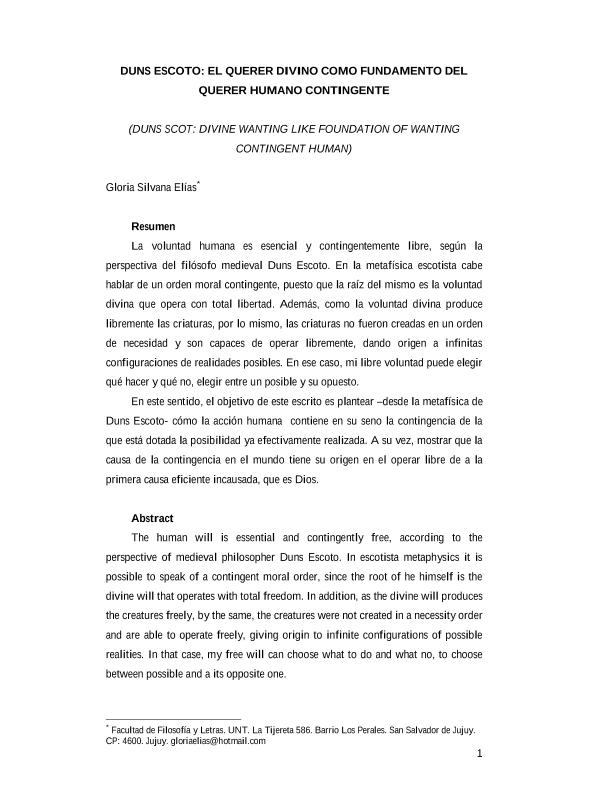Mostrar el registro sencillo del ítem
dc.contributor.author
Elías, Gloria Silvana

dc.date.available
2019-08-26T18:16:59Z
dc.date.issued
2008-12
dc.identifier.citation
Elías, Gloria Silvana; Duns Escoto: el querer divino como fundamento del querer humano contingente; Universidad Nacional de Jujuy. Facultad de Humanidades y Ciencias Sociales; Cuadernos; 34; 12-2008; 281-291
dc.identifier.issn
0327-1471
dc.identifier.uri
http://hdl.handle.net/11336/82110
dc.description.abstract
La voluntad humana es esencial y contingentemente libre, según la perspectiva del filósofo medieval Duns Escoto. En la metafísica escotista cabe hablar de un orden moral contingente, puesto que la raíz del mismo es la voluntad divina que opera con total libertad. Además, como la voluntad divina produce libremente las criaturas, por lo mismo, las criaturas no fueron creadas en un orden de necesidad y son capaces de operar libremente, dando origen a infinitas configuraciones de realidades posibles. En ese caso, mi libre voluntad puede elegir qué hacer y qué no, elegir entre un posible y su opuesto. En este sentido, el objetivo de este escrito es plantear -desde la metafísica de Duns Escoto- cómo la acción humana contiene en su seno la contingencia de la que está dotada la posibilidad ya efectivamente realizada. A su vez, mostrar que la causa de la contingencia en el mundo tiene su origen en el operar libre de a la primera causa eficiente incausada, que es Dios.
dc.description.abstract
The human will is essential and contingently free, according to the perspective of medieval philosopher Duns Escoto. In escotista metaphysics it is possible to speak of a contingent moral order, since the root of he himself is the divine will that operates with total freedom. In addition, as the divine will produces the creatures freely, by the same, the creatures were not created in a necessity order and are able to operate freely, giving origin to infinite configurations of possible realities. In that case, my free will can choose what to do and what no, to choose between possible and a its opposite one.
In this sense, the objective of this writing is to raise - from the metaphysics of Duns Escoto- how the human action contains in its sine the contingency with which is equipped the possibility already indeed made. To show as well that the cause of the contingency in the world has its origin in free operating of a the first incausada efficient cause, that is God.
dc.format
application/pdf
dc.language.iso
spa
dc.publisher
Universidad Nacional de Jujuy. Facultad de Humanidades y Ciencias Sociales

dc.rights
info:eu-repo/semantics/openAccess
dc.rights.uri
https://creativecommons.org/licenses/by-nc-sa/2.5/ar/
dc.subject
Contingencia
dc.subject
Libertad
dc.subject
Posibilidad
dc.subject
Voluntad
dc.subject.classification
Estudios Religiosos

dc.subject.classification
Filosofía, Ética y Religión

dc.subject.classification
HUMANIDADES

dc.title
Duns Escoto: el querer divino como fundamento del querer humano contingente
dc.title
Duns Scot: Divine wanting like foundation of wanting contingent human
dc.type
info:eu-repo/semantics/article
dc.type
info:ar-repo/semantics/artículo
dc.type
info:eu-repo/semantics/publishedVersion
dc.date.updated
2019-08-14T18:55:53Z
dc.identifier.eissn
1668-8104
dc.journal.number
34
dc.journal.pagination
281-291
dc.journal.pais
Argentina

dc.journal.ciudad
San Salvador de Jujuy
dc.description.fil
Fil: Elías, Gloria Silvana. Consejo Nacional de Investigaciones Científicas y Técnicas. Centro Científico Tecnológico Conicet - Tucumán; Argentina. Universidad Nacional de Jujuy. Facultad de Humanidades y Ciencias Sociales. Unidad de Investigación de Pensamiento Lat., Relaciones Interetn. e Interculturales; Argentina
dc.journal.title
Cuadernos
dc.relation.alternativeid
info:eu-repo/semantics/altIdentifier/url/http://ref.scielo.org/h2sbnd
dc.relation.alternativeid
info:eu-repo/semantics/altIdentifier/url/http://revista.fhycs.unju.edu.ar/revistacuadernos/index.php/cuadernos/issue/archive
Archivos asociados
